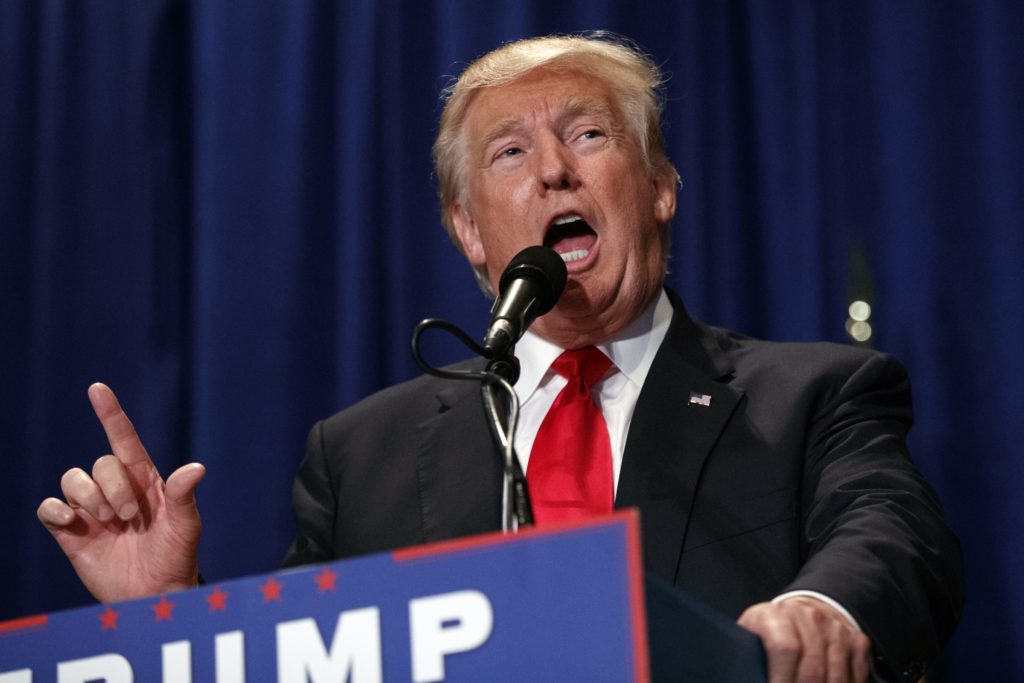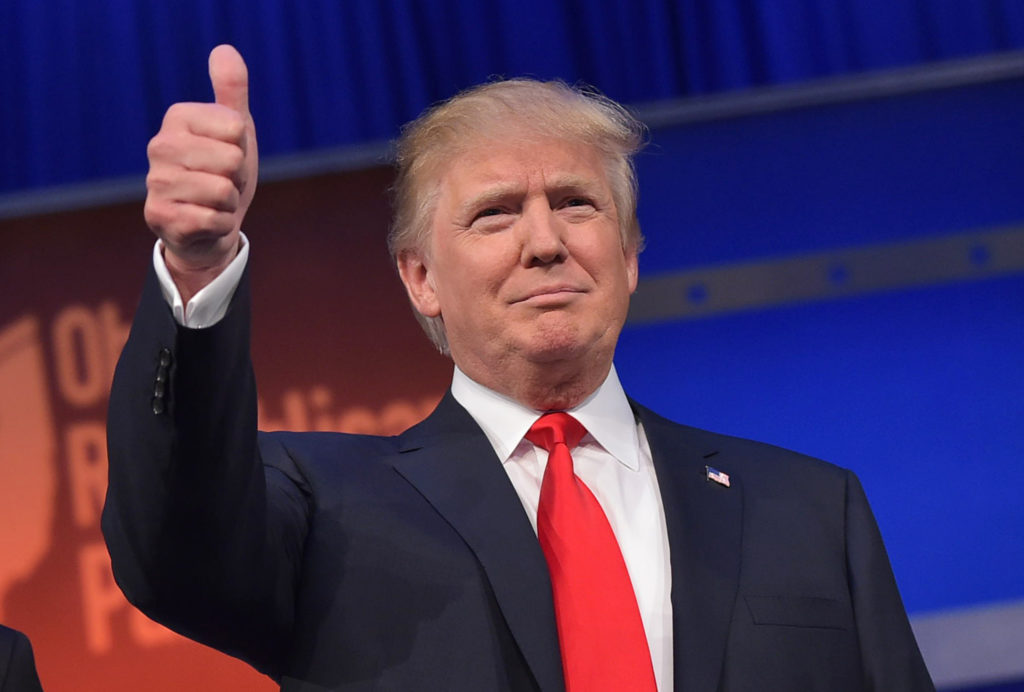Donald Trump makes first ad buys in battleground states, including Florida

With his new leadership team promising a sharper message, Donald Trump on Thursday moved to invest nearly $5 million in battleground state advertising. The investment over the coming 10 days in Florida, North Carolina, Ohio and Pennsylvania marks the Republican presidential contender’s first major general election expenditures in the swing states, which are considered critical to his narrowing path to the White House. The advertising plans, confirmed by Kantar Media’s political ad tracker, come a day after Trump announced another senior staffing shakeup. Weary Republican leaders hope the new leadership team can reverse the New York businessman’s struggles even as some worry it’s too little too late. The Republican nominee tapped Stephen Bannon — a combative conservative media executive with no presidential campaign experience — to serve as CEO of his White House bid. Pollster Kellyanne Conway, who has known Trump for years and gained his trust during her brief tenure working for him, will serve as campaign manager. “I think we’re going to sharpen the message,” Conway told CNN. “We’re going to make sure Donald Trump is comfortable about being in his own skin — that he doesn’t lose that authenticity that you simply can’t buy and a pollster can’t give you. Voters know if you’re comfortable in your own skin.” The Republican National Committee has already conceded it may divert resources away from the presidential contest favor of vulnerable Senate and House candidates if Trump’s standing does not improve in the coming weeks. RNC chief strategist Sean Spicer called Trump’s staffing changes the “healthy growth of the campaign at a senior level at a key point.” He also urged caution as Trump’s new team contemplates whether the fiery populism and freewheeling style that won him the Republican nomination will give him a better shot at the White House than uniting his party and rallying moderate voters. “I think people want him to be authentic,” Spicer said. “They appreciate he’s not a scripted politician, but there’s a recognition that words do matter.” The staffing changes are aimed in part at marginalizing campaign chairman Paul Manafort, a longtime Republican operative who pushed Trump to moderate his tone and improve relations with skeptical Republican officials. In breaking with that approach, Trump appears set on finishing the race on his own terms — win or lose. Trump’s divisive tone and weak poll numbers have triggered a rash of Republican defections in recent weeks. Party loyalists have grown increasingly frustrated with Trump’s inability to stay focused on Democrat Hillary Clinton amid a series of self-created distractions. “I don’t care if Donald Duck is running the campaign,” said Henry Barbour, a Republican National committeeman from Mississippi. “If he can make this thing about Hillary Clinton’s record and getting the country back on track, that’s what’s going to win this election.” Despite the new advertising investment, Trump is woefully behind: Clinton’s campaign has spent more than $75 million on ads in the weeks since she effectively locked up the nomination in early June, according to Kantar Media’s political ad tracker. Trump frequently boasts that his rival is spending heavily while he’s put nothing into advertising, banking so far on free wall-to-wall media coverage to carry his message. While his campaign has been silent through paid media, he’s had some assistance from outside political groups, Kantar Media shows. One, called Rebuilding America Now, has spent about $9 million in the past few weeks. The National Rifle Association’s political arm has also put more than $4 million into anti-Clinton messages. But these amounts pale in comparison to the $31 million the pro-Clinton super PAC Priorities USA has spent on air since mid-June. And that’s just one of several groups helping her. Rarely do presidential campaigns wait so long to advertise, or undergo such a level of leadership tumult at such a stage of the general election. The developments come less than three months before Election Day, and roughly six weeks before early voting begins. Trump’s standing in the White House race plummeted throughout the summer and he now trails Clinton in preference polls of most key battleground states. He’s struggled to offer voters a consistent message, overshadowing formal policy speeches with a steady stream of controversies, including a public feud with an American Muslim family whose son was killed while serving in the U.S. military in Iraq. Bannon’s website has been fiercely loyal to Trump for months and sharply critical of Republican leaders, including House Speaker Paul Ryan. Breitbart has also actively promoted false conspiracy theories about Clinton, and some have then made their way into Trump’s remarks. “Trump is on his third campaign manager in three months. If this was a hot dog stand, conclusion might be there was a problem with the dogs,” Republican strategist Stuart Stevens, a frequent Trump critic, wrote on Twitter. Republished with permission of the Associated Press. Republished with permission of the Associated Press.
Donald Trump makes first battleground state ad buys

With his new leadership team promising a sharper message, Donald Trump on Thursday moved to invest nearly $5 million in battleground state advertising. The investment over the coming 10 days in Florida, North Carolina, Ohio and Pennsylvania marks the Republican presidential contender’s first major general election expenditures in the swing states, which are considered critical to his narrowing path to the White House. The advertising plans, confirmed by Kantar Media’s political ad tracker, come a day after Trump announced another senior staffing shakeup. Weary Republican leaders hope the new leadership team can reverse the New York businessman’s struggles even as some worry it’s too little too late. The Republican nominee tapped Stephen Bannon – a combative conservative media executive with no presidential campaign experience – to serve as CEO of his White House bid. Pollster Kellyanne Conway, who has known Trump for years and gained his trust during her brief tenure working for him, will serve as campaign manager. “I think we’re going to sharpen the message,” Conway told CNN. “We’re going to make sure Donald Trump is comfortable about being in his own skin – that he doesn’t lose that authenticity that you simply can’t buy and a pollster can’t give you. Voters know if you’re comfortable in your own skin.” The Republican National Committee has already conceded it may divert resources away from the presidential contest favor of vulnerable Senate and House candidates if Trump’s standing does not improve in the coming weeks. RNC chief strategist Sean Spicer called Trump’s staffing changes the “healthy growth of the campaign at a senior level at a key point.” He also urged caution as Trump’s new team contemplates whether the fiery populism and freewheeling style that won him the Republican nomination will give him a better shot at the White House than uniting his party and rallying moderate voters. “I think people want him to be authentic,” Spicer said. “They appreciate he’s not a scripted politician, but there’s a recognition that words do matter.” The staffing changes are aimed in part at marginalizing campaign chairman Paul Manafort, a longtime Republican operative who pushed Trump to moderate his tone and improve relations with skeptical Republican officials. In breaking with that approach, Trump appears set on finishing the race on his own terms – win or lose. Trump’s divisive tone and weak poll numbers have triggered a rash of Republican defections in recent weeks. Party loyalists have grown increasingly frustrated with Trump’s inability to stay focused on Democrat Hillary Clinton amid a series of self-created distractions. “I don’t care if Donald Duck is running the campaign,” said Henry Barbour, a Republican National committeeman from Mississippi. “If he can make this thing about Hillary Clinton‘s record and getting the country back on track, that’s what’s going to win this election.” Despite the new advertising investment, Trump is woefully behind: Clinton’s campaign has spent more than $75 million on ads in the weeks since she effectively locked up the nomination in early June, according to Kantar Media’s political ad tracker. Trump frequently boasts that his rival is spending heavily while he’s put nothing into advertising, banking so far on free wall-to-wall media coverage to carry his message. While his campaign has been silent through paid media, he’s had some assistance from outside political groups, Kantar Media shows. One, called Rebuilding America Now, has spent about $9 million in the past few weeks. The National Rifle Association‘s political arm has also put more than $4 million into anti-Clinton messages. But these amounts pale in comparison to the $31 million the pro-Clinton super PAC Priorities USA has spent on air since mid-June. And that’s just one of several groups helping her. Rarely do presidential campaigns wait so long to advertise, or undergo such a level of leadership tumult at such a stage of the general election. The developments come less than three months before Election Day, and roughly six weeks before early voting begins. Trump’s standing in the White House race plummeted throughout the summer and he now trails Clinton in preference polls of most key battleground states. He’s struggled to offer voters a consistent message, overshadowing formal policy speeches with a steady stream of controversies, including a public feud with an American Muslim family whose son was killed while serving in the U.S. military in Iraq. Bannon’s website has been fiercely loyal to Trump for months and sharply critical of Republican leaders, including House Speaker Paul Ryan. Breitbart has also actively promoted false conspiracy theories about Clinton, and some have then made their way into Trump’s remarks. “Trump is on his third campaign manager in three months. If this was a hot dog stand, conclusion might be there was a problem with the dogs,” Republican strategist Stuart Stevens, a frequent Trump critic, wrote on Twitter. Republished with permission of the Associated Press.
What does Jeb Bush get for $20 million in TV ad buys? Not much.

Jeb Bush and his supporters have spent more than twice that of any other candidate or outside group on TV ads in the 2016 presidential race. And what does the former Florida governor get for nearly $20 million, asks Mark Murray of NBC News. Apparently, not much. Bush’s poll numbers are currently languishing in the single digits both nationally and in the early primary states. Right to Rise, the pro-Bush super PAC, has made $19.5 million in ad spending for Iowa, New Hampshire and South Carolina. Murray notes that the campaign also spent another $438,000. In comparison, the 501c4 organization supporting fellow Floridian Marco Rubio – Conservative Solutions Project – paid half that amount, $8.4 million to date. Hillary Clinton’s presidential campaign, on the other hand, has spent $8.1 million, while her supporting Super PAC spent about $199,000. To put those numbers further in context, campaigns receive substantial discounts on TV ad time, whereas Super PACs and other outside groups may have to pony up to four times as much for similar ad space. Murray, along with NBC News partners SMG Delta, have calculated who spent what in the 2016 presidential ad wars – a not-quite-perfect way to measure winners of the secret advertising primary. Through Nov. 21, the leaders are Bush with $19.9 million ($19.5 million from Right to Rise Super PAC, $438K from campaign), followed by Rubio with $8.4 million (all from outside group Conservative Solutions Project), Clinton with $8.3 million ($8.1 million from campaign, $199K from Priorities USA Super PAC) and Ohio Gov. John Kasich with $7.3 million (all from two outside groups). After Kasich, comes New Jersey Gov. Chris Christie with $5.7 million ($5.3 million from America Leads Super PAC, $407K from campaign), Louisiana Gov. Bobby Jindal – who just dropped out of the race – with $3.3 million (all from outside groups), Vermont Sen. Bernie Sanders with $3 million (all from his campaign), South Carolina Sen. Lindsey Graham at $1.7 million ($1.6 million from Super PAC, $100K from campaign) and retired neurosurgeon Ben Carson with $1.5 million (all from his campaign). For the week of Nov. 15-21, the biggest spenders were Bush with $2 million, all from his Super PAC; Sanders with $940,000, all from his campaign; Clinton with $741,000, all from the campaign; Rubio with $619,000, all from Conservative Solutions; Kasich with $352,000, all from his supporting Super PAC New Day for America, Christie with $313,000, all from America Leads Super PAC; and Carson with $214,000, all of which came from his campaign.


